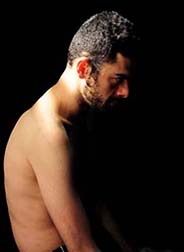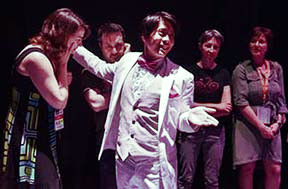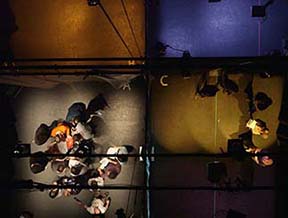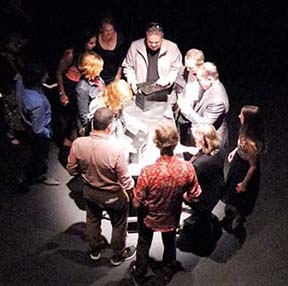
Lucy Komisar
|
“Foreign Radical” asks
audience to profile selves
“Foreign Radical” In “Foreign Radical,” set in the age of surveillance aimed at catching terrorists, border controls become an immersive game show. The first dark space you enter has an Arab (Ayro Khakpour) naked, leaning over a table. There is Arabic writing on a wall; the emoji is a skull. In 2014, the US changed its requirements for putting individuals on a terrorism watch list. They no longer need “concrete facts” or “irrefutable evidence,” just suspicion. Get on the list, and you get enhanced surveillance and screenings at airports. In 2015 U.S. security added half a million people to the watch list. You will learn why this matters when the host (Milton Lim), snazzy and slick in a white tux, orders the audience/participants into quadrants of a set where they will be interrogated and self-profiled. They will be moved to use the same vague standards to decide whether a suspected terrorist, ie. a Muslim, (Khakpour), should be subject to enhanced interrogation.
You exit to another space with disco music. You learn how spies stole the keys to Edinburgh Castle. (A bit of a local joke) And that there is now a secret government rulebook for labeling you a terrorist, no evidence required. It’s the U.S. National Terrorist Watchlist guidance for 17 agencies. The host asks, “Who wants to bag some tourists? I mean some terrorists.” But, it’s not about you, right? Then the show makes you profile yourself. In rooms divided into quadrants, people who answer yes or no to questions are directed into defined boxes. Do you belong to a political party? Did you work on a political campaign? Have you signed a petition critical of the government? Have you defaced corporate or public property to make a political statement? Atheists to one side: a lot. Did you donate to a nonprofit? A big group. So, this is the liberal Edinburgh Fringe. It is not going to set up the left against the right.
Do you change your online password? Have you watched porn on the internet? Based on the self-selection, the game show host picks one guy as the most radical. And, by the way, are you aware that you no longer have privacy, that all this is being spied on, ascertained, by the surveillance police? We move to another room, where there is a small box and a book to look into. A text says, “We started killing people, then they started killing us.” Then through gauze we see the Arab. “He pasted a picture from Abu Graib and a photo of a bloody girl in Manchester.” Irrefutable evidence or concrete facts are not required Another room is a border crossing, and we see the Arab again. He screams, “You demand my hate and you have it.” We are asked if we would report someone with jihadist views. Some would. Others begin to think how they could be targeted themselves.
An audience member who knows Arabic is part of a group that searches the suspect’s suitcase. He reads some articles that turn out to be printed from the internet. He declares the guy is not a radical. He explains the subtleties of documents from Iran that don’t support the Islamic terrorists. No one else would know. But the rest of the audience isn’t sure. A middle-aged white guy says it’s not so terrible if someone has to wait a few hours to be interrogated at an airport. I asked how he would feel if all Tories were subject to that. I should have said far-rightists. The audience votes, and the suspect is on the ground.
In an eerie coda, we enter a room where the suspect is in a chair, dressed, facing us and holding a mike. He says, “In the future, no one will be able to travel. If they once knew someone.” The Host asks, “Would you be willing to give a urine sample for a drug test so that you could cross a border? Would you be willing to be strip searched so that you could cross a border?” It’s not a show you leave saying “this was a great show” or “what a great plot” or what terrific actors. Though Lim and Khakpour are fine. But that’s not the point. In fact, the plot is not very subtle. It’s really a sort of parlor game. You are the actors and you make the plot. You leave understanding how flimsy are the standards for choosing “terrorists.” And how with the right color skin or name, you could be a target. On the other hand, there really are terrorists. They do blow up
planes and people. You sure don’t want to be on one of those
planes. How should security agencies spot them? Do we want to end
all surveillance? Maybe the net is cast too wide, but where should
the limits be? Officials confronted with citizens angry at this
wide net should come up with better solutions. All the evidence
is that they don’t care and they won’t. Visit Lucy’s website http://thekomisarscoop.com/ |
| museums | NYTW mail | recordings | coupons | publications | classified |





